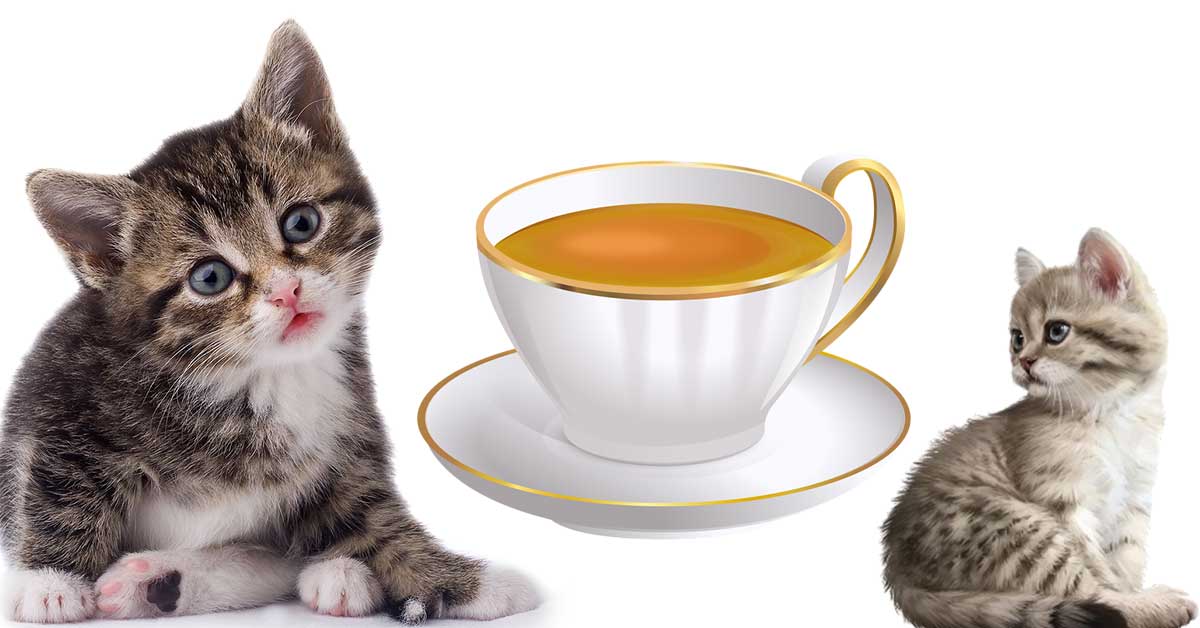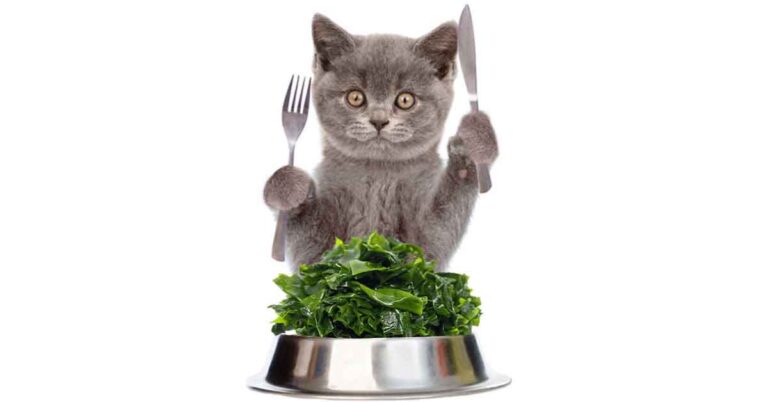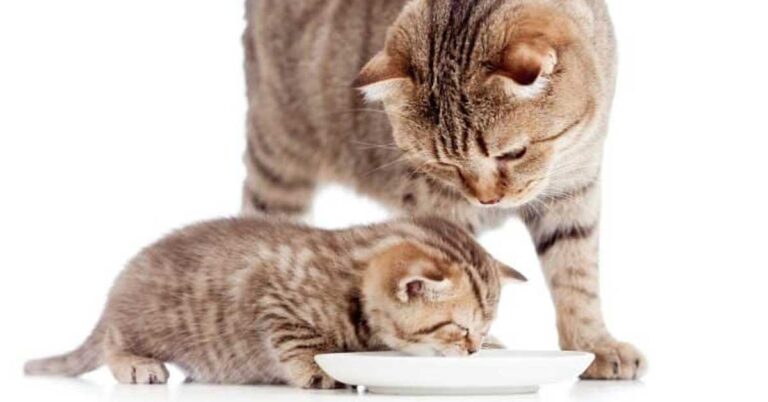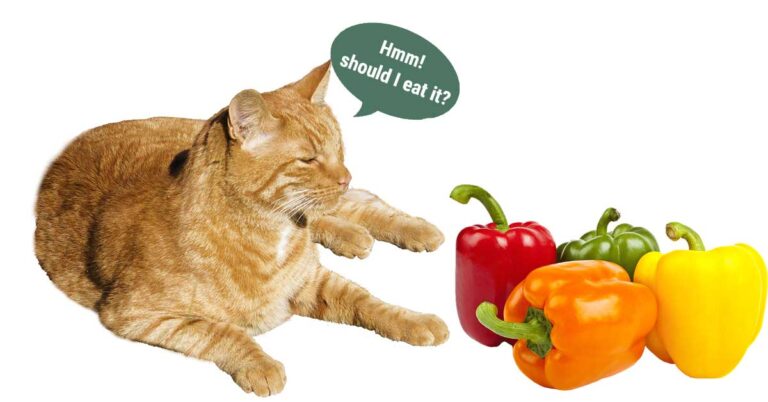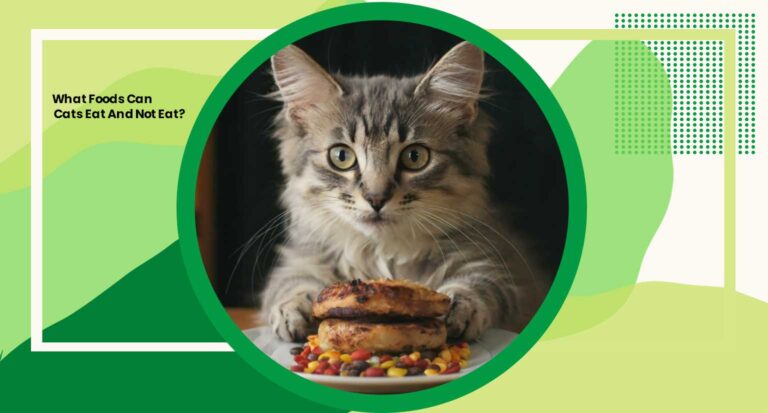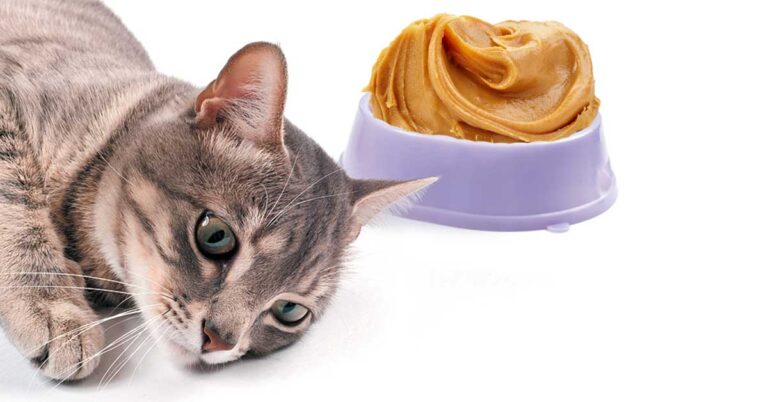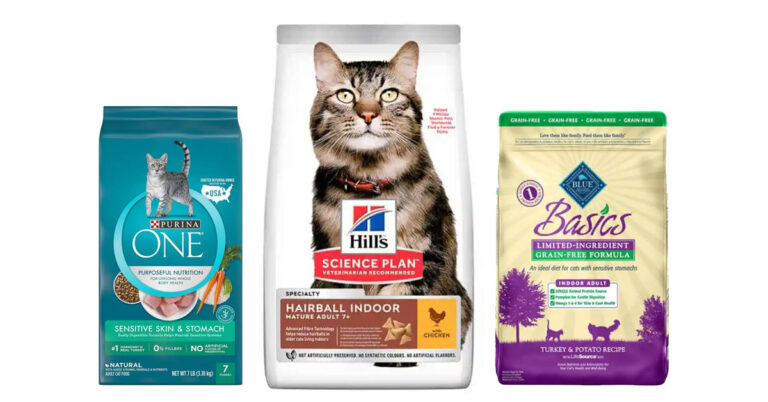Can Cats Drink Tea?
Welcome, fellow cat lovers! Today, we’re delving into an intriguing topic that’s been brewing among feline enthusiasts the benefits and drawbacks of cats drinking tea. While sipping a hot cup of tea may be a soothing ritual for us humans, the implications for our feline friends are not as straightforward.
It’s important to understand that cats have different dietary needs and tolerances compared to us. While some components found in tea, such as flavonoids, have been studied for their potential health benefits in humans, their effects on cats are still largely unknown Moreover, certain ingredients commonly found in teas could potentially pose risks to your feline companion.
So, while we humans may find a lot of comfort and joy in a hot cup of tea, it’s best to keep this particular pleasure to ourselves and stick to water for our whiskered companions. Remember, when it comes to your pet’s diet, it’s always best to consult with your vet if you’re unsure about what’s safe for them to consume.
On the other hand, some herbal teas might offer benefits, such as calming effects. However, it’s crucial to consult with a vet before introducing any new substance into your cat’s diet. Not all herbs are safe for cats, and what is beneficial to one cat might not be to another.
Understanding Cats and Caffeine
While the small amount of caffeine in your morning brew may kick-start your day, it could have adverse effects on your furry friend. Caffeine is a toxic substance for cats, even in small quantities. The digestive system of adult cats processes caffeine differently than humans do, leading to caffeine toxicity, a major concern that can significantly affect a cat’s health.
The symptoms of caffeine poisoning in cats include a rapid increase in heart rate, excessive energy, rapid breathing, and in severe cases, even muscle tremors. If your cat shows any of these following symptoms after ingesting a product with caffeine, immediate veterinary attention is necessary.
It’s not just traditional teas from the Camellia Sinensis (tea plant) that pose a risk. Coffee beans, energy drinks, and certain types of iced tea or decaffeinated tea can also contain harmful amounts of caffeine. Cat owners need to be aware that even decaffeinated green tea and other decaffeinated products still contain small amounts of caffeine, which could cause adverse reactions in their feline friends.
Types of Teas and Their Effect on Cats
The type of tea you may consider offering your cat plays a vital role in its potential impact on their health. Teas derived from the tea plant, like black tea, Earl Grey, and even some decaffeinated teas, are typically high in caffeine. Large amounts of such teas can lead to symptoms of caffeine poisoning in cats and should be avoided.
Herbal infusions or herbal teas, on the other hand, generally do not contain caffeine, and certain types might even provide health benefits. Chamomile tea, for instance, can have calming effects, while catnip tea can entertain and delight your feline companion. However, even these should be given in small amounts and never replace the regular diet or fresh water supply of your cat.
Still, not all herbal teas are safe. Some, like peppermint tea, ginger tea, or those with strong essential oils, can lead to digestive problems or upset stomachs in cats. Similarly, fruit teas often contain artificial flavors and sweeteners that are harmful to your cat’s digestive system.
When considering any kind of tea as a treat for your feline friend, it’s always a good idea to consult with your vet first.
Understanding Camellia Sinensis
Camellia Sinensis, more commonly known as the tea plant, is the source of many favorite hot beverages, including black tea, Earl Grey, and certain types of iced tea. However, teas derived from this plant contain caffeine. As the cat’s digestive system is sensitive to caffeine, even the small amount found in a few tea leaves could cause serious health issues. Caffeine toxicity in cats can lead to elevated heart rate, altered brain function, and in severe cases, it could be fatal.
The caffeine content in teas from the Camellia Sinensis plant varies, with black tea generally having more caffeine than green tea. However, even decaffeinated versions of these teas still contain trace amounts of caffeine. Therefore, it’s recommended that cat owners avoid giving their pets any type of tea from the Camellia Sinensis plant.
The presence of caffeine is not the only concern. Tea leaves also contain tannins and other compounds that can negatively affect a cat’s digestive system, potentially leading to an upset stomach or more serious digestive problems. Instead of sharing a sip of your favorite tea, ensure your cat has a constant supply of clean water for hydration.
Impact of Black Tea on Cats
Despite its popularity among humans, black tea is not a good idea for our feline friends. Brewed from the Camellia Sinensis plant, black tea naturally contains a significant amount of caffeine. While humans may enjoy the boost in energy, the caffeine in black tea can lead to serious health problems in cats, including rapid breathing, elevated heart rate, and in severe cases, muscle tremors or more severe symptoms of caffeine poisoning.
In addition to caffeine, black tea contains tannins, which can interfere with a cat’s ability to absorb certain nutrients, leading to potential health issues over time. It’s also worth noting that adding milk or cream to black tea, as many tea drinkers do, introduces dairy products that adult cats often have trouble digesting.
Given these potential adverse effects, it’s clear that black tea is not suitable for cats. Instead of sharing your cup of black tea with your feline companion, it’s best to provide them with a bowl of fresh, clean water, or occasionally, a specially designed cat tea made with their health and preferences in mind.
Role of Ginger and Peppermint Teas
Ginger and peppermint teas are popular herbal infusions enjoyed by many for their flavor and health benefits. However, when it comes to sharing these teas with our feline companions, caution is necessary.
While ginger is often used in small quantities to help with digestive issues in humans, it can potentially cause an upset stomach in cats. Furthermore, strong essential oils found in ginger tea can be too intense for a cat’s digestive system, leading to discomfort and potentially, adverse reactions.
Peppermint tea, on the other hand, contains essential compounds that can be harmful to cats if consumed in large quantities. The menthol in peppermint can cause digestive problems, and in excessive amounts, it can result in more serious health issues, such as nervous system disorders. Therefore, peppermint tea should not be given to cats.
Given these potential risks, ginger, and peppermint teas, while beneficial for humans, should not be considered safe options for cats. It’s best to stick to providing clean water for hydration and occasionally, a little bit of catnip tea or other cat-friendly herbal infusions, always after consulting with your vet.
Implication of Herbal Teas
Herbal teas, or herbal infusions, present a unique case when it comes to cats and tea. Unlike traditional teas derived from the Camellia Sinensis plant, herbal teas generally contain no caffeine. However, it’s not to say all herbal teas are safe for your feline friends. Certain herbs, like valerian root, have properties that can be harmful to cats, while others may contain strong essential oils or artificial flavors that could upset your cat’s stomach.
Chamomile tea, on the other hand, is a great way to soothe an anxious cat. Known for its calming properties, chamomile tea in small amounts can offer a gentle way to calm a nervous cat. However, it should be served at room temperature to avoid causing burns or discomfort, and never replace fresh water in your cat’s diet.
Catnip tea is another interesting option for feline companions. Derived from a plant that naturally attracts most cats, catnip tea can be a fun and safe way to treat your furry friend. But remember, like all good things, it should be given in moderation.
Despite the potential benefits of certain herbal teas, it’s essential to consult with a veterinarian before introducing any new food or drink to your cat’s diet. While small amounts of certain herbal teas can be safe, they should never be given in large amounts or on a regular basis.
Case of Decaffeinated Teas
Decaffeinated teas may seem like the safest option for your feline friend at first glance. After all, they are free of the caffeine that can cause health issues in cats, right? Not exactly. The truth is, while decaffeinated teas do contain much less caffeine than their caffeinated counterparts, they are not completely caffeine-free. Even a small amount of caffeine can cause symptoms of caffeine poisoning in cats.
Moreover, many decaffeinated teas, including green and black varieties, are still derived from the Camellia Sinensis plant, which means they also contain tannins. These compounds can interfere with a cat’s absorption of nutrients and can lead to digestive problems if ingested in large quantities.
While decaffeinated teas are less likely to cause caffeine toxicity than regular teas, they are not completely risk-free. As a cat owner, it’s important to remember that the safest option for your cat’s hydration needs is always clean, fresh water. Offering a small amount of a cat-friendly herbal infusion on occasion, after consulting with your vet, can be a fun treat for your cat. However, regular or large amounts of any kind of tea, decaffeinated or not, should be avoided to ensure your cat’s health and well-being.
Why Chamomile Tea Might Not Be Safe?
Chamomile tea is often touted for its calming effects in humans, and some pet parents may wonder if it can provide similar benefits for their feline companions. While it’s true that chamomile tea can have soothing properties, it’s not always a good idea for cats.
The primary concern lies in the potential allergic reactions. Like people, cats can have allergies, and chamomile is a known allergen. If your cat is allergic to chamomile, consumption could lead to adverse effects ranging from an upset stomach to more severe allergic reactions.
Additionally, chamomile tea often comes in tea bags which could pose a choking hazard for curious cats. If a cat ingests the tea bag, it could lead to an obstructed digestive tract, a serious health concern that requires immediate veterinary attention.
Even if your cat isn’t allergic to chamomile, it’s important to serve the tea at room temperature to avoid burning your cat’s sensitive mouth and to offer it in moderation. It should never replace water as the primary source of hydration, nor should it be given on a regular basis without a vet’s approval. Always consult with your veterinarian before introducing any new food or beverage into your cat’s diet to ensure it’s safe.
Fruit Teas: Are They Safe?
Fruit teas, with their enticing aromas and flavors, are often a favorite choice for many tea lovers. But when it comes to sharing these aromatic brews with your feline friends, caution is required. Most fruit teas are infused with a variety of fruits, artificial flavors, and sweeteners, all of which can be harmful to cats.
Many artificial sweeteners, such as xylitol, are toxic to cats and can cause serious health problems, including liver failure. Additionally, artificial flavors and certain fruits used in these teas can upset a cat’s stomach, leading to discomfort or even more serious digestive issues.
Moreover, like other teas derived from the Camellia Sinensis plant, fruit teas often contain caffeine, which can lead to caffeine toxicity in cats. Symptoms of caffeine poisoning include rapid breathing, increased heart rate, and in severe cases, muscle tremors and seizures.
While the idea of your cat enjoying a sip of your favorite fruity brew may seem tempting, it’s not worth the potential risk. To keep your furry friend healthy and happy, it’s best to stick to clean, fresh water and leave the fruit teas for the human members of your household.
Assessing Earl Grey
Earl Grey is a popular type of tea known for its distinct flavor, which comes from the addition of oil extracted from the rind of the bergamot orange. But, is it safe for cats? The answer, unfortunately, is no.
Like black and green teas, Earl Grey is derived from the Camellia Sinensis plant, meaning it contains caffeine. As we’ve discussed earlier, caffeine can cause serious health problems in cats, including symptoms of caffeine poisoning like rapid breathing, increased heart rate, and muscle tremors.
Moreover, the bergamot oil that gives Earl Grey its unique taste can also be harmful to cats. Essential oils, including citrus oils like bergamot, are toxic to cats and can cause digestive upset, nervous system disorders, and other adverse health effects.
Given these potential hazards, it’s clear that Earl Grey, like other teas derived from the Camellia Sinensis plant, is not a safe choice for your feline friend. As always, the best drink for your cat is clean, fresh water. For an occasional treat, consider a small amount of catnip tea or another cat-friendly herbal infusion, after consulting with your vet.
Cats and Tea Preparation
The Dangers of Hot Water, Consideration for Iced Tea
When brewing a cup of tea for yourself, you likely don’t give a second thought to the temperature of the water or the possible choking hazards that tea bags might pose. But when it comes to cats and tea, these are significant concerns that need to be addressed.
Hot water, for starters, is a danger in and of itself. Cats have very sensitive mouths and throats, and hot beverages can cause severe burns. Therefore, any tea given to a cat should always be at room temperature to avoid any risk of injury.
Moreover, tea bags pose a serious choking hazard for cats. Cats are naturally curious and may be attracted to the string and tag of a tea bag, leading them to accidentally swallow it. Ingesting a tea bag can lead to an obstructed digestive tract, a major concern that requires immediate veterinary attention.
As for iced tea, while it may seem like a safe option because it is served cold, remember that it is still tea. Most iced teas are made from black or green tea, both of which contain caffeine. As previously discussed, caffeine can lead to symptoms of caffeine poisoning in cats and other serious health problems.
In conclusion, it’s essential to remember that although we humans enjoy a wide range of teas, these drinks are not suitable for our feline friends. The best beverage for a cat remains clean, fresh water, and on occasion, a small amount of a cat-friendly herbal infusion, always after consulting with a vet.
Assessing the Risk of Small Amounts of Tea
Some cat owners may wonder if small amounts of tea would be safe for their feline companions. After all, a little sip couldn’t hurt, right? Unfortunately, this is not the case when it comes to cats and tea. Even small amounts of tea can pose a risk to your cat’s health due to the presence of caffeine and other potentially harmful ingredients.
Cats are much smaller than humans and their digestive systems are more sensitive, making them more susceptible to the effects of caffeine and other substances found in tea. Even a small amount of caffeine can cause an increased heart rate, rapid breathing, restlessness, and in severe cases, symptoms of caffeine poisoning. Cats also lack the enzyme necessary to metabolize caffeine effectively, meaning that it stays in a cat’s system longer and increases the risk of adverse effects.
Furthermore, certain types of tea contain substances that can be harmful to cats in any quantity. For example, essential oils found in some herbal and fruit teas can cause digestive upset and other health issues in cats. Even decaffeinated tea, while containing less caffeine, is not completely risk-free.
In conclusion, it’s best to err on the side of caution when it comes to cats and tea. While the idea of sharing your favorite hot cup of tea with your furry friend may be tempting, the potential risks far outweigh the momentary pleasure. Clean, fresh water is the safest and best choice for your cat’s hydration needs.
Adverse Effects of Teas on Cats
The Danger of Rapid Heartbeat, Influence on Cat’s Blood Pressure, Digestive System Upset
When cats ingest tea, they may experience a range of adverse effects due to the caffeine and other substances found in the beverage. One of the most immediate and noticeable effects is an increased heart rate or rapid heartbeat. This occurs because caffeine is a stimulant that affects the central nervous system, causing the heart to beat faster. In extreme cases, this can lead to irregular heart rhythms or even heart failure.
Along with an increased heart rate, caffeine can also affect a cat’s blood pressure. It can cause a significant spike in blood pressure, which can be dangerous, especially for cats with pre-existing heart conditions. High blood pressure can lead to further heart complications and is a major concern for any cat.
Additionally, teas can upset a cat’s digestive system. The caffeine, artificial flavors, and essential oils found in some teas can cause a range of digestive problems, from minor discomfort and upset stomach to more serious issues like diarrhea, vomiting, and nutrient malabsorption. If a cat ingests a tea bag, this can lead to a blockage in the digestive tract, which is a serious health emergency requiring immediate veterinary attention.
In severe cases, caffeine ingestion can lead to caffeine toxicity, a serious and potentially fatal condition. Symptoms of caffeine poisoning include restlessness, rapid breathing, muscle tremors, seizures, and in severe cases, collapse or loss of consciousness. If your cat shows any of these symptoms after ingesting tea, seek immediate veterinary attention.
In conclusion, although tea may be a comforting and enjoyable drink for humans, it poses significant risks to our feline companions. Always keep your tea out of reach of your cats and stick to offering them fresh, clean water for their hydration needs.
Alternatives to Tea for Cats
The Benefits of FreshWater
The best beverage for your cat is, without a doubt, fresh water. Water is vital for maintaining your cat’s health, aiding in digestion, nutrient absorption, circulation, and flushing out toxins. It helps regulate body temperature and promotes optimal kidney function, keeping your cat well-hydrated and in good health. Always ensure your cat has a clean, fresh supply of water available.
Safe Use of Ice Cubes
If your cat enjoys playing with moving water, adding a few ice cubes to their water bowl can be a great way to keep them engaged and hydrated. Ice cubes can provide a fun, interactive experience and keep the water cool, particularly in hot weather. However, they should be used with caution to avoid potential choking hazards. Always supervise your cat while they play with ice cubes, and use cubes large enough not to be a choking risk or small enough to swallow safely.
Choosing Wet Food
Wet food can also be a good source of hydration for cats. Compared to dry kibble, wet food has a high water content, often up to 80%. Incorporating wet food into your cat’s diet can help ensure they get enough water, especially if they’re not big drinkers. However, it’s important to remember that while wet food can supplement their water intake, it should not replace the need for a freshwater source.
The Role of Catnip Tea
For a fun, cat-safe alternative to tea, consider offering your cat a small amount of catnip tea. Catnip, a member of the mint family, is known for its ability to elicit euphoric responses in many cats when smelled, and when ingested, can have a mild sedative effect. Brewing a weak catnip tea and offering it at room temperature can be a fun treat for your cat. However, it’s important to consult with your vet before introducing catnip tea into your cat’s diet and to only offer it on occasion and in moderation as too much can cause digestive upset.
Tea Ingredients and Cat Health
Dangers of Essential Oils
Essential oils are often found in various types of teas, including herbal and fruit teas, and contribute significantly to their aroma and flavor. However, they can pose serious risks to cats. Cats lack certain liver enzymes, making it difficult for them to metabolize and eliminate essential oils. As a result, these oils can build up to toxic levels, leading to symptoms like drooling, vomiting, tremors, and in severe cases, liver failure. Even oils considered safe for human consumption, like peppermint or citrus oils, can be harmful to cats.
The Truth About Artificial Sweeteners and Flavors
Many teas, particularly fruit and iced teas, often contain artificial sweeteners and flavors. These additives may make the teas more appealing to us, but they can be toxic to cats. Xylitol, a common artificial sweetener, is particularly dangerous and can lead to a rapid drop in blood sugar and liver failure in cats. Artificial flavors, too, can cause digestive upset, leading to symptoms like vomiting and diarrhea. It’s crucial to keep any teas or other foods containing these ingredients out of reach of your cats.
Potential Risks of Dairy Products
If you enjoy a splash of milk in your tea, you might wonder if your feline friend could enjoy the same. However, it’s important to note that many adult cats are lactose intolerant. Their bodies do not produce enough lactase, the enzyme needed to break down lactose in milk. Consequently, consuming milk or other dairy products can lead to digestive problems like upset stomach, bloating, and diarrhea. Therefore, it’s best to avoid giving cats tea with dairy products, despite the popular image of cats enjoying a saucer of milk.
Cats and Human Beverages
From tea to coffee and even energy drinks, humans enjoy a wide variety of beverages. But when it comes to our feline friends, it’s important to remember that what’s safe and enjoyable for us isn’t always the same for them. Cats have different digestive systems and metabolisms, making them more sensitive to certain substances found in human drinks.
Caffeinated beverages, in particular, pose a risk to cats. As we’ve learned, even a small amount of caffeine can lead to caffeine toxicity, causing symptoms such as rapid heartbeat, restlessness, muscle tremors, and in severe cases, seizures. Coffee beans, like tea leaves, are also part of the Camellia Sinensis plant family and contain similar levels of caffeine, making them equally dangerous.
Energy drinks, too, are a no-go for cats. They often contain high amounts of caffeine, as well as other harmful ingredients like artificial sweeteners and flavors. Ingesting these drinks can lead to serious health problems, including caffeine toxicity, digestive upset, and even liver failure.
Alcoholic beverages are also harmful to cats. Alcohol can cause a range of health issues in cats, from vomiting and diarrhea to difficulty breathing, tremors, coma, and in severe cases, death.
Even seemingly harmless drinks like milk and juice can be problematic. As mentioned earlier, many adult cats are lactose intolerant, so dairy products can cause digestive upset. Juices, particularly those with added sugars or artificial sweeteners, can also cause digestive issues, as well as contribute to obesity and dental problems.
In conclusion, when it comes to beverages, the safest option for cats is clean, fresh water. It’s the best way to ensure they stay hydrated and healthy. If you’re ever unsure about a particular food or drink’s safety, always consult with your vet before giving it to your cat.
Understanding the Good in Teas for Cats
While it’s true that many types of tea and their ingredients can be harmful to cats, there are certain exceptions to the rule. Some “teas,” particularly those made with cat-safe herbs, can offer benefits when used appropriately and under veterinary guidance.
For example, catnip tea, made from the leaves of the catnip plant, can be a source of enjoyment for many cats. When ingested, catnip can have a mild sedative effect, which can be useful in calming an anxious cat. However, it’s important to offer catnip tea in moderation to prevent digestive upset.
Another example is valerian root tea. Valerian is often used as a calming agent in humans and can have a similar effect in cats. However, like catnip, it should be used in moderation, under the guidance of a vet, and not as a regular part of your cat’s diet.
Slippery elm bark is a herb that can be used to make a kind of herbal infusion or “tea” for cats. It can soothe the digestive tract and is often used for cats with chronic digestive issues. However, it’s crucial to consult with a vet before starting any herbal treatments, as they can interact with other medications or underlying health issues.
It’s also worth mentioning that these herbal infusions do not contain caffeine or any of the other potentially harmful substances found in traditional teas. This is a key distinction, as it’s these substances, particularly caffeine, that make most teas unsafe for cats.
In conclusion, while certain herbal infusions can offer benefits to cats, it’s essential to approach this area with caution. Always consult with your vet before giving your cat any new type of food or drink, even those that are marketed as safe for pets.
Warning Signs of Tea Poisoning in Cats
Understanding the signs of tea poisoning in cats can help pet parents act swiftly and seek necessary medical attention. Exposure to caffeine, a common ingredient in most types of tea, can lead to caffeine toxicity in cats. Symptoms can vary based on the amount ingested and the individual cat’s sensitivity. Some common symptoms of caffeine poisoning include:
- Restlessness: Affected cats may seem unusually active, anxious, or unable to settle down.
- Rapid breathing: Caffeine can stimulate the respiratory system, leading to increased breathing rate.
- Rapid heart rate: An accelerated heart rate or irregular heartbeat can also be an early sign of caffeine toxicity.
- Muscle tremors: Caffeine can cause muscle tremors or twitching in cats. This can appear as uncontrollable shaking or twitching of the limbs.
- Vomiting or Diarrhea: Digestive upset, including vomiting and diarrhea, can occur due to irritation of the digestive system.
- Seizures: In severe cases, caffeine toxicity can lead to seizures or loss of consciousness.
If you notice any of these signs or suspect that your cat has ingested tea or any other caffeinated substance, it’s important to seek veterinary attention immediately. Caffeine toxicity can be life-threatening, and early treatment is crucial. In many cases, with prompt treatment, cats can recover from caffeine toxicity. However, prevention is always better than cure. Keep all tea bags, loose tea leaves, and brewed tea out of reach of your feline friends to avoid accidental ingestion.
Conclusion
Tea is a favorite beverage for many humans, offering a soothing experience and a broad spectrum of flavors. However, when it comes to our feline friends, it’s not such a good idea. Cats are highly sensitive to caffeine, a key component in many types of tea, and even small amounts can lead to serious health problems, including caffeine toxicity.
From the camellia sinensis plant, which gives us black tea and Earl Grey, to herbal teas like peppermint and chamomile, the risks far outweigh any potential benefits. Decaffeinated teas, while lower in caffeine, still present dangers due to residual caffeine content and other potentially harmful ingredients.
Other elements in tea, like hot water, essential oils, artificial sweeteners and flavors, and dairy products, can also pose risks to cats. So even with cautious preparation and choosing seemingly safer options, the potential for adverse effects remains.
However, it’s not all bad news. Certain cat-safe herbal infusions, like catnip tea or valerian root, can offer benefits when used sparingly and under veterinary guidance. Still, these should not be seen as a regular part of your cat’s diet.
The best beverage for your feline friend? Clean, fresh water. It keeps them hydrated, aids their digestion, and comes without the risks associated with tea and other human drinks.
Being a responsible cat owner involves understanding what’s safe and what’s not for our feline companions. By keeping tea and other potentially harmful substances out of their reach, we can help ensure they stay happy, healthy, and safe.

